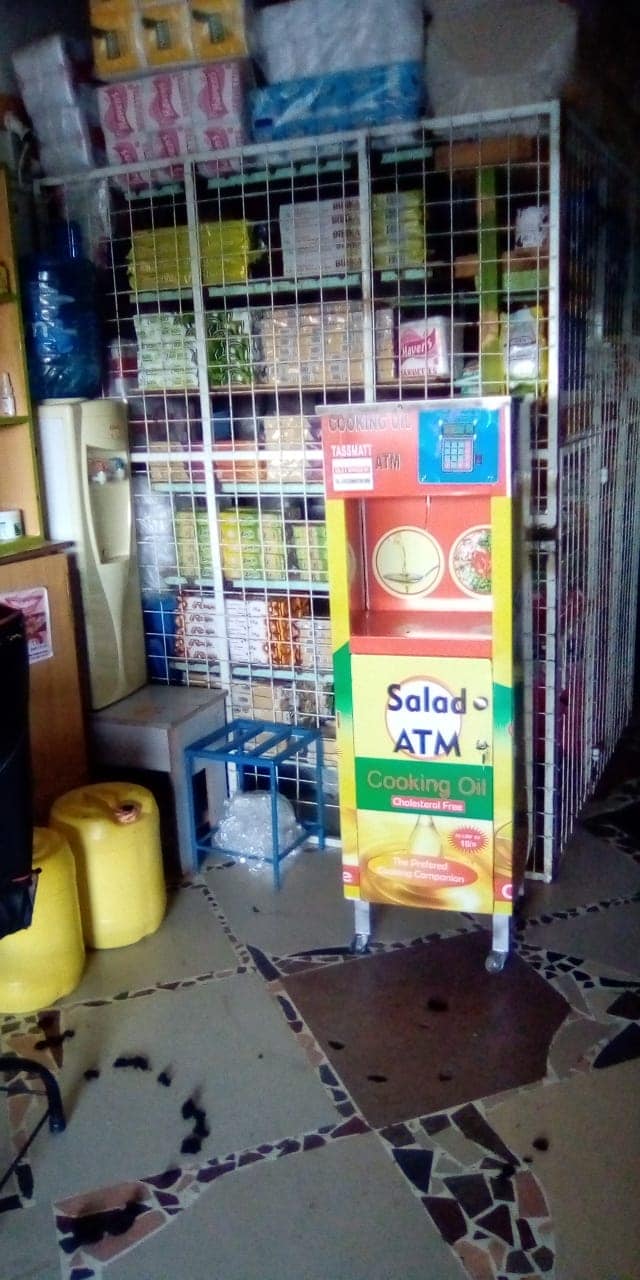Empowering Kadogo Economy: Cooking Oil Dispensing ATMs Revolutionize Sales in Informal Kenyan Markets
In the bustling informal markets of Kenya, a silent revolution is taking place, driven by the introduction of cooking oil dispensing ATMs. These innovative machines are transforming the way cooking oil is sold and consumed, particularly in low-income communities.
Traditionally, cooking oil has been sold in large quantities, often in bulk or in liter bottles, making it difficult and expensive for many Kenyans to access. This has often led to financial strain and the use of unhealthy alternatives, such as reused cooking oil.
The advent of Cooking Oil ATMs has addressed this challenge by providing a convenient and affordable way to purchase cooking oil in small quantities, from as low as 10 Kenyan shillings. This has been a boon for many Kenyans, particularly those living in informal settlements and rural areas, who often struggle to make ends meet.

The positive impact of Cooking Oil ATMs extends beyond convenience and affordability. They have also contributed to improved hygiene standards, as they eliminate the need for handling and pouring oil from large containers. Additionally, they have reduced the risk of oil spillage and wastage, further promoting cost savings and environmental sustainability.
The growth of the Cooking Oil ATM industry has been spearheaded by Tassmatt Limited, a leading Kenyan company specializing in innovative vending solutions. Based in Nairobi’s Umoja neighborhood, Tassmatt offers a range of Cooking Oil ATMs, catering to various capacities and requirements.
With an online shop at www.tassmatt.com, Tassmatt has made it easy for shop owners and entrepreneurs across Kenya to acquire these machines. Prices start as low as Kshs 38,000, making them an accessible investment for even small businesses.
The introduction of Cooking Oil ATMs has not only empowered small-scale shop owners but has also created employment opportunities for machine operators and maintainers. This has contributed to the growth of the kadogo economy, the informal sector that drives much of Kenya’s economic activity.
As the Cooking Oil ATM revolution continues to spread, it is evident that these machines are playing a significant role in improving the lives of Kenyans, particularly those in low-income communities. By providing access to affordable and hygienic cooking oil, they are contributing to better health, financial stability, and environmental sustainability. The Cooking Oil ATM is a testament to the power of innovation to address challenges and empower communities in the informal sector.
The Ripple Effect of Cooking Oil ATMs: Enhancing Livelihoods and Fostering Growth
The impact of Cooking Oil ATMs extends beyond the immediate benefits of providing affordable cooking oil. These machines have created a ripple effect that is transforming livelihoods and fostering growth within the kadogo economy.
Empowering Women Entrepreneurs:
Cooking Oil ATMs have proven to be a particularly empowering tool for women entrepreneurs, who often face challenges in accessing traditional business financing. The relatively low investment required to purchase and operate a Cooking Oill ATM has enabled many women to start their own businesses, providing them with a source of income and economic independence.
Creating Employment Opportunities:
The Cooking Oil ATM industry has also created employment opportunities for both skilled and unskilled labor. Trained technicians are required to install and maintain the machines, while operators are needed to supervise the dispensing process and provide customer service. These jobs have provided much-needed income for individuals in communities where employment opportunities are often limited.
Boosting Local Businesses:
The increased availability of affordable cooking oil has led to a rise in demand for other food items and groceries in the vicinity of Cooking Oil ATMs. This has boosted sales for local businesses, stimulating the overall economy of informal settlements and rural areas.
Promoting Financial Inclusion:
The ability to purchase cooking oil in small quantities has also encouraged financial inclusion among low-income communities. By reducing the need for large upfront payments, Cooking Oil ATMs have made essential commodities more accessible, allowing individuals to manage their finances more effectively.
Fostering Innovation:
The success of Cooking Oil ATMs has inspired further innovation within the kadogo economy. This spirit of innovation is driving the growth and diversification of the kadogo economy, creating new opportunities for businesses and individuals alike.
In conclusion, Cooking Oil ATMs have emerged as a transformative force in the informal Kenyan market. By addressing the challenges of access, affordability, and hygiene, these machines are empowering individuals, creating employment opportunities, and stimulating economic growth. The Cooking Oil ATM is a powerful example of how innovation can bring about positive change in low-income communities, fostering financial inclusion, promoting sustainable practices, and empowering individuals to take control of their livelihoods.

